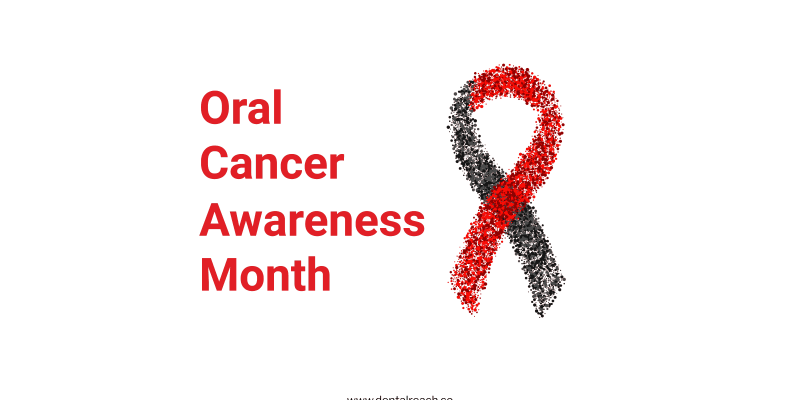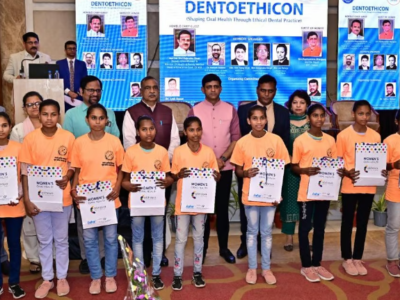April is oral cancer awareness month worldwide. To highlight this, here are some oral cancer knowledge updates. Dentists are the only medical faculty to diagnose oral cancers initially than others during routine mouth check-up. That’s why visiting a dentist is mandatory.
Why is oral cancer awareness an important public service message?
Many oral cancers can be prevented in their initial stages, before getting worse. Diagnosing malignant lesions and oral cancers during mouth check-ups is dentist’s responsibility. Make patients aware of their oral health. Oral cancer awareness is the basic aim of this article. Statistics are provided in this article are from various sources.
In India, death due to tobacco is estimated at 3,500 people per day approximately. According to the latest data, smoking caused 3, 17,928 deaths among men and women approximately.
Over 25% of male cancer deaths are due to Oral and Lung cancers. cancer of breast and oral cavity account for 25% of deaths in women. One-third of oral cancer cases are from India in the world. Oral cancer accounts for 30% of all cancers in India.
According to Globocan, around 1, 19,992 new cases of oral cancers diagnosed every year and deaths 72,616 worldwide. Out of the newly diagnosed cases, about 60% won’t live longer than 5 years. Many who survive after the treatments suffer from severe facial disfigurement or difficulties in eating and speaking. The death rate from oral cancer is high due to routinely late discovered. Generally, men suffer and die more than women from oral cancer.
Causes for Oral Cancer
Oral cancer is any neoplasm found on the lip, floor of the mouth, cheek lining, gingiva, palate or in the tongue. Oral cancer is among top three types of Cancer observed in India. Common risk factors are severe alcoholism, use of tobacco like cigarettes, smokeless tobacco, betel nut chewing and human papillomavirus (HPV).
It may also occur due to poor dental care and poor diet. The incidence of oral cancer is higher in India, South and Southeast Asian countries. Around 90 -95% of the oral cancers are squamous cell carcinomas in India.
According to the international agency for cancer research, India’s incidence has increased from 1 million in 2012 and would increase more than 1.7 million by 2035. This indicates that the cancer death rate would also increase from 680,000 to 1- 2 million at the same time.
In India, oral cancer is interrelated to low income. Low social-economic class is often associated with factors like lack of nutrition, health care, squalid living conditions and risk behaviours, contributing to oral cancer development.
Most of the population lacks access to a well organised and well regulated cancer care system in low and middle-income countries; they don’t have personal health insurances.
A cancer diagnosis often burdens high health expenditures. Such expenditures impoverish homes and push entire families below the poverty line, bringing about social instability. There are no significant advancements in the treatment so far.
Although, present treatments improve the life of oral cancer patients but for public point of view, these treatment results have failed to improve overall survival rates of 5 years in the past decades.
Incidence of oral cancer in India
Incidence of oral cancer is 53,842 in males and 23,161 in females seven years ago. Oral cancer is considered to be a disease which occurs in elderly people. Most of the oral cancer cases occur between 50 to 70 years but may occur in 10 years old children. Incidences of oral cancer increase with age.
Fifth decade of life is common for cancer development. In India, men are two to four times more affected than women due to changes in the behavioural and lifestyle patterns, but high incidence rates are seen amongst South Indian women due to tobacco chewing. Tongue Cancer is the most common type of cancer and common sites are buccal mucosa and gingiva.
Chances of developing oral cancer in addicted patients are 8.4 times higher than that non-addictive patients. Use of tobacco in the form of smoking has 5.19 times higher risk or chances of having pre-cancerous lesions on palate when compared to that of tobacco chewing. Most of the oral cancer patients are found in Uttar Pradesh, Jharkhand and Bihar.
Burden of Oral cancer in India
20 per 100,000 people are affected by oral cancer which is about 30% of all types of cancer. More than 5 people in India die every hour because of oral cancer and the same for cancer of oropharynx and hypo pharynx.
Cancer registration is not compulsory in the country; so actual incidence and mortality are not predicted. Many cases are unrecorded and lose to follow up during treatment. There is no national registry that monitors cancer incidences, that’s why actual cases are based on various surveys.
The National Cancer Registry Program collects numbers that are population-based data from a selected network of 28 cancer registration centres located in different parts of the country. Various studies use data from urban and rural cancer registries established at national and regional level.
Urban registries are at Delhi, Mumbai and Chennai, and rural registries are at Barshi, Dindigul, Manipuri, Karunaga-pally, Ernakulum, Srikakulam and Bhavnagar.
There is still need for providing cancer detecting, treatment centres. Many people can’t afford high treatment cost. Negligence in the initial stages makes the situation worse for the advanced ones.
This burden of detecting oral cancer at initial stages can be reduced by implementing dentist in this program as they are the first one to diagnose oral cancers during routine dental checkups.
Conclusion
Visit your dentist for dental checkups regularly as they are the only medical faculty to diagnose precancerous lesions and cancers at initial stages. Governments should enrol more dentists in oral cancer screening programs across India to reduce the burden. Spread awareness to the general public about oral cancer in various campaigns and social activities, etc.
References
-
- http://cancerindia.org.in/cancer-statistics/
- http://cancerindia.org.in/oral-cancer/
- https://www.timesnownews.com/health/article/oral-cancer-cases-increase-by-114-per-cent-in-india-in-6-years-risk-factors-and-prevention-tips/315143


















Comments